Police Department Scheduling Software: Master Law Enforcement Shift Management

In law enforcement, effective scheduling is essential for public safety and officer efficiency. Yet, many police departments face challenges in managing officer shifts, coordinating resources, and ensuring compliance. This article explores police scheduling software, offering insights into its benefits, features, and top options available, including free solutions tailored for law enforcement agencies. Whether overseeing a small-town police department or a bustling metropolitan force, finding the right police department scheduling software can significantly impact operational efficiency and officer morale. Let’s explore how you could manage your police department shifts and with what tools and solutions!
Key Features of Police Department Scheduling Software
Let’s take a moment to explore the key features that any effective scheduling software for law enforcement should offer.
- ➡️ Shift management tools: Efficiently schedule officers for duty, manage shifts, and handle changes seamlessly within the software.
- ➡️ Comprehensive time tracking: Track officers’ work hours, including regular shifts, overtime, and time off, ensuring accurate payroll and compliance with labor regulations.
- ➡️ Reporting capabilities: Generate detailed reports on officer schedules, attendance, and productivity to gain insights and facilitate decision-making for resource allocation and planning.
- ➡️ Mobile accessibility: Allow officers to access their schedules, submit time-off requests, and receive shift updates via mobile apps.
- ➡️ Integration capabilities: Seamlessly integrate scheduling software with other law enforcement systems such as CAD (Computer-Aided Dispatch) and RMS (Records Management System) for data synchronization and workflow optimization.
❗ Please note that at Everhour, we do not accept paid entries for inclusion in our list of law enforcement scheduling software solutions.
Shifts by Everhour provides an intuitive solution for managing employee schedules with ease. From flexible scheduling options to mobile accessibility, it’s the ideal solution for optimizing workforce management in any industry.
Police Scheduling Solutions
Manual scheduling: Traditional yet troublesome
Manual scheduling, often done through paper timesheets or basic spreadsheet software, has long been the go-to method for many police departments to manage officer shifts. However, this approach comes with its fair share of challenges.

⌛ Time drain: Creating, updating, and distributing schedules manually is a time-consuming process. Supervisors spend considerable hours on these tasks, leading to inefficiencies and delays.
⛔ Error-prone: Manual scheduling increases the risk of errors, such as double-booked shifts or inaccurate record-keeping. These mistakes can impact officer morale and departmental operations.
🤷♀️ Lack of flexibility: With manual scheduling, changes or last-minute adjustments are difficult to communicate effectively. This lack of real-time visibility can lead to confusion among officers and supervisors, resulting in operational disruptions.
While manual scheduling has been a traditional approach, its limitations highlight the pressing need for modern scheduling solutions to address these challenges effectively.
Excel spreadsheets: A common choice with limitations
Many police departments resort to Excel spreadsheets as a step up from manual scheduling methods. While Excel offers some advantages over paper-based systems, it also presents its own set of challenges.
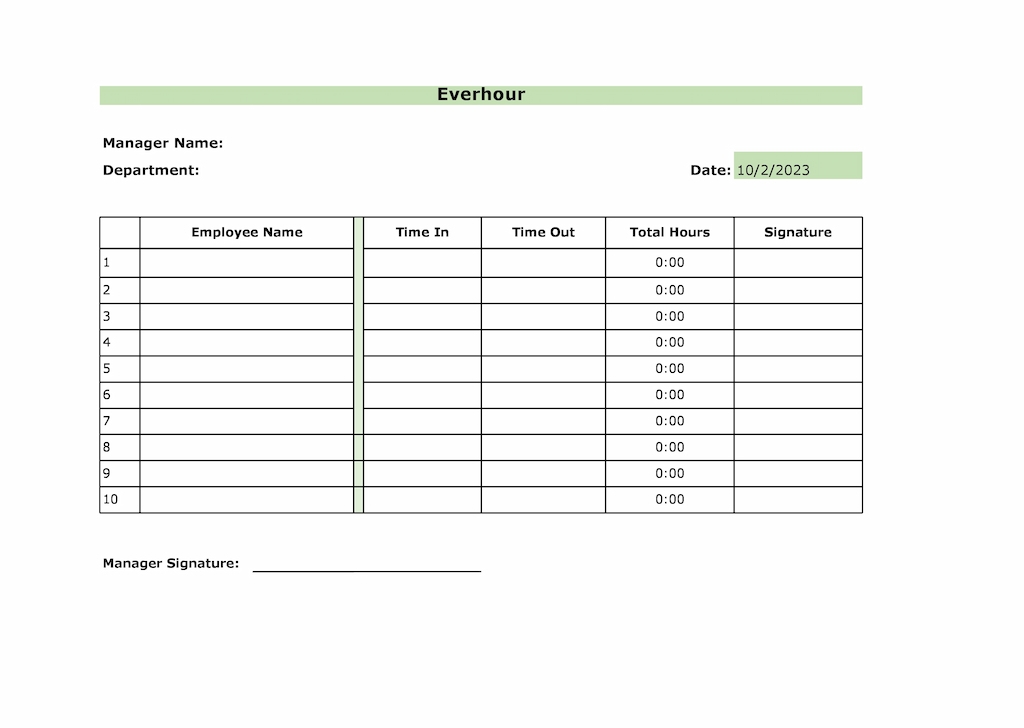
❗ Limited automation: Excel allows for some degree of automation compared to paper timesheets. However, setting up formulas and templates can be time-consuming, and the level of automation is often limited.
⛔ Data entry errors: Despite its digital format, Excel is still prone to data entry errors. Mistyped information or misplaced data cells can lead to inaccuracies in officer schedules, impacting departmental operations.
📢 Version control issues: Collaborating on Excel spreadsheets can be challenging, especially when multiple users are involved. Version control becomes a concern, as different versions of the spreadsheet may circulate among team members, leading to confusion and discrepancies.
📉 Scalability challenges: Excel becomes less efficient as the size and complexity of scheduling tasks grow. Managing large volumes of data and coordinating schedules for multiple officers and shifts can quickly overwhelm Excel’s capabilities.
While Excel spreadsheets offer some level of organization and digitization compared to manual methods, their limitations underscore the need for more robust and specialized scheduling solutions tailored to the unique requirements of police departments.
Web-based police shift scheduling software: Streamlining police department operations
Transitioning from manual methods or Excel spreadsheets to web-based police officer scheduling systems represents a significant leap forward for police departments seeking efficiency and modernization in their operations. While not always free, the advantages offered by these police scheduler solutions often far outweigh the costs, making them a worthwhile investment.
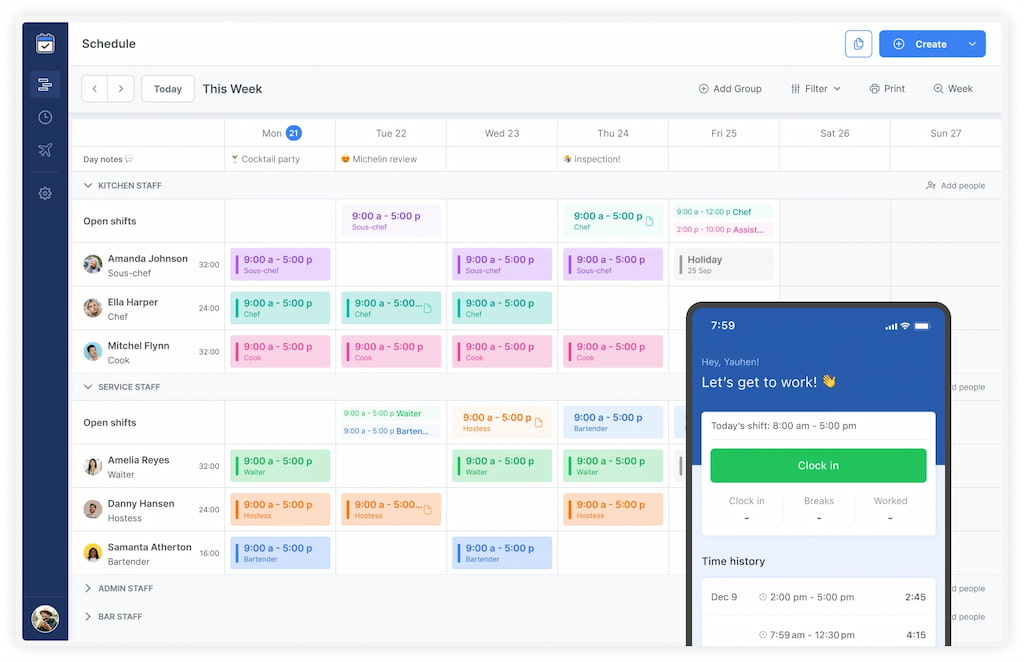
🚀 Enhanced automation: Web-based public safety scheduling software offers advanced automation features that simplify the scheduling process. From generating shift schedules to managing time-off requests and overtime calculations, these tools streamline administrative tasks, freeing up valuable time for departmental staff.
🎯 Improved accuracy: By digitizing scheduling processes and centralizing data storage, web-based software helps minimize errors and inconsistencies. Officers can access up-to-date schedules from any location, reducing the likelihood of scheduling conflicts and ensuring better adherence to departmental policies.
🔁 Enhanced collaboration: Collaborative features built into a web-based police officer schedule system facilitate communication and coordination among team members. Supervisors can easily share schedules, assign shifts, and communicate changes in real-time, fostering greater transparency and accountability within the department.
📈 Scalability and flexibility: Unlike Excel spreadsheets, police schedule software is designed to handle the complex scheduling needs of police departments of all sizes. Whether managing a small team or a large force, these solutions offer scalability and flexibility to adapt to changing operational requirements.
💸 Cost-effective solutions: While some web-based scheduling software solutions require a subscription fee, many offer free or low-cost options for departments with budget constraints. These free versions often provide essential scheduling features, making them accessible to departments with limited resources.
Overall, web-based police schedule makers offer a comprehensive solution for police departments looking to optimize their scheduling processes and improve overall operational efficiency. While the initial investment may be required, the long-term benefits in terms of time savings, accuracy, and streamlined operations make it a valuable asset for any modern law enforcement agency.
Shifts by Everhour: Optimizing police scheduling
Shifts by Everhour stands out as one of the top options for law enforcement agencies seeking efficiency, flexibility, and ease of use. This intuitive, feature-rich, and free police scheduling software offers a range of tools specifically designed to meet the unique scheduling needs of police departments.
1️⃣ Customizable shift scheduling: Shifts by Everhour empowers police departments to tailor shift schedules to their precise requirements, facilitating seamless assignment and management of shifts.
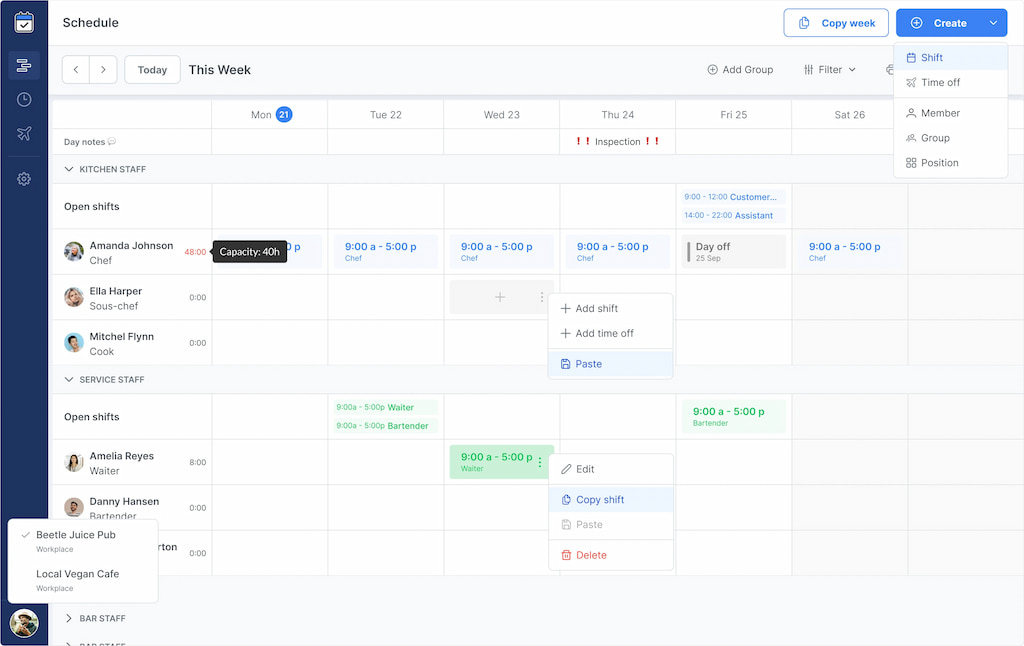
2️⃣ Attendance tracking: With robust attendance tracking capabilities, Shifts ensures accurate monitoring of officer attendance, enabling supervisors to maintain staffing levels effectively.
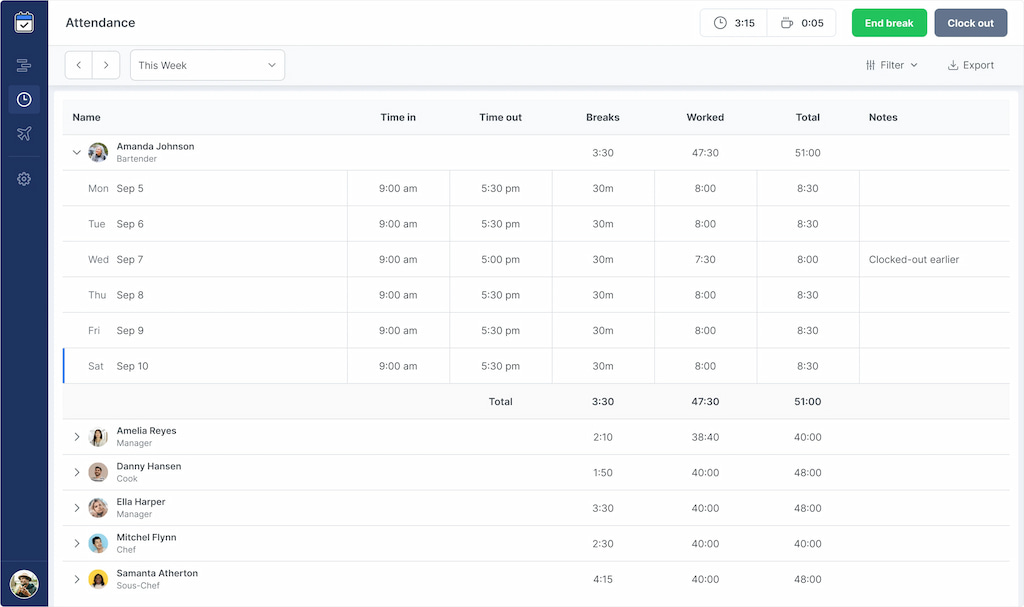
3️⃣ Mobile clock-in/out: Officers can easily clock in and out using the mobile app, providing flexibility and convenience for on-the-go scheduling management.
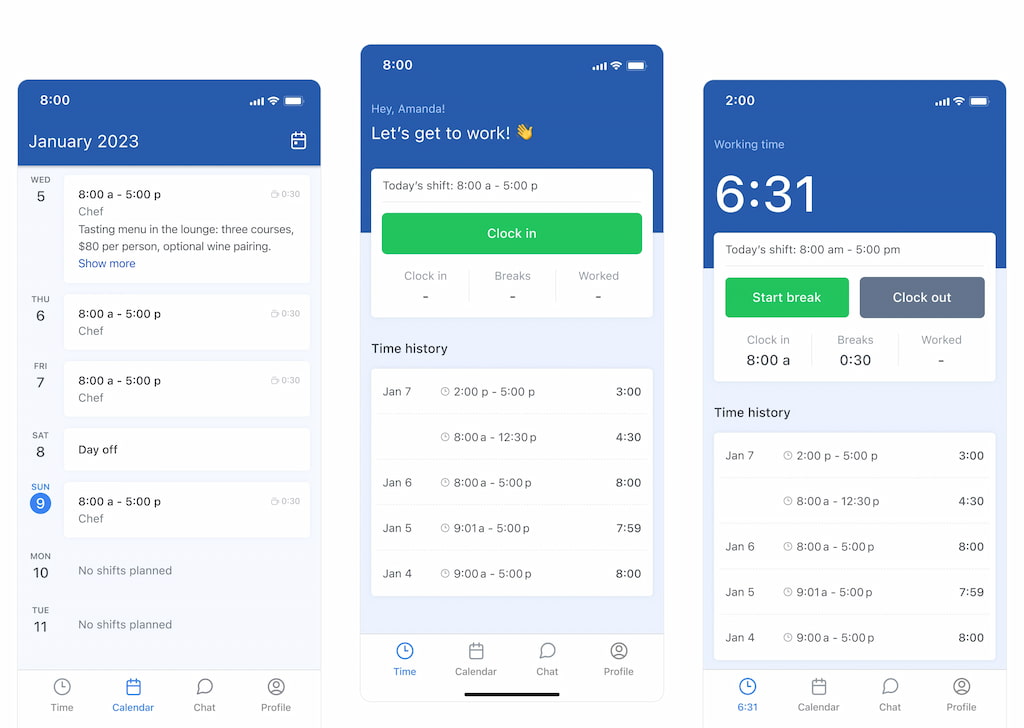
4️⃣ Open shifts management: Administrators can effortlessly manage open shifts, facilitating efficient shift allocation and ensuring optimal staffing coverage.
5️⃣ User-friendly interface: Shifts boasts an intuitive interface designed for ease of use, minimizing the learning curve for both supervisors and officers.
6️⃣ Free pricing: As a free law enforcement software solution, Shifts by Everhour offers exceptional value without sacrificing essential features, making it an ideal choice for budget-conscious police departments.
Shifts by Everhour provides law enforcement agencies with a comprehensive and user-friendly scheduling solution, empowering them to optimize workforce management and enhance operational efficiency.
Mobile apps: Versatile yet vexing
Officers can easily view their shift assignments, request time off, and communicate with supervisors through the app, enhancing communication and efficiency. Additionally, mobile apps streamline the scheduling process by reducing paperwork and administrative tasks, saving time and resources for police departments. However, while mobile apps for police scheduling offer convenience and flexibility by allowing officers to access their schedules anytime, anywhere, they also introduce various challenges.
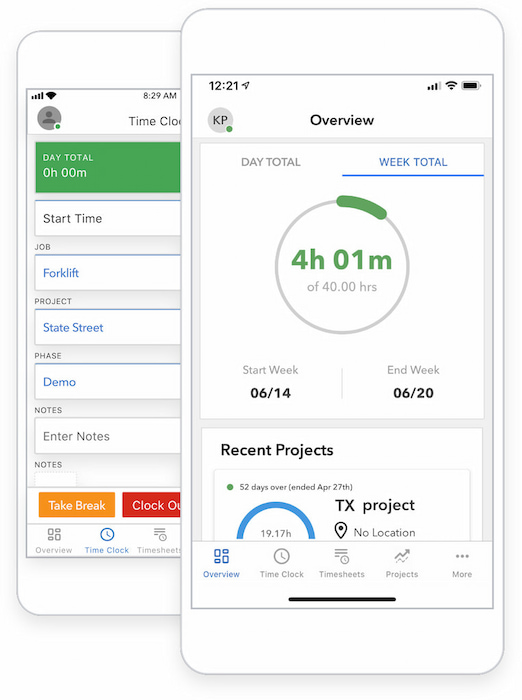
👩💻 Dependency on technology: Relying solely on mobile apps for scheduling introduces a dependency on technology. Any technical issues, such as app crashes or network connectivity issues, can disrupt the scheduling process and lead to confusion among officers.
🔐 Security concerns: Mobile apps may pose security risks, particularly when officers access sensitive scheduling information from personal devices. Departments need to implement robust security measures to safeguard against data breaches and unauthorized access to confidential information.
👩🏫 Training and adoption: Implementing a new mobile scheduling app requires officers and supervisors to undergo training to familiarize themselves with the app’s features and functionality. Ensuring widespread adoption of the app across the department may require ongoing support and encouragement from leadership.
📱 Device compatibility: Not all officers may have access to compatible mobile devices or reliable internet connections, particularly in rural or remote areas. Departments need to consider the accessibility of mobile apps for all officers to ensure equitable access to scheduling tools.
😒 User experience: The user experience of mobile scheduling apps can vary significantly depending on factors such as app design, navigation, and responsiveness. Poorly designed apps may lead to frustration and resistance among users, undermining the effectiveness of the scheduling system.
🔄 Data synchronization: Maintaining accurate and up-to-date scheduling information across multiple devices can be challenging. Departments need to ensure that mobile apps sync seamlessly with the central scheduling system to avoid discrepancies or conflicts in shift assignments and availability.
While mobile apps offer convenience and flexibility for police scheduling, addressing these challenges is crucial to maximizing their effectiveness and ensuring smooth operations within law enforcement agencies.
Integrated public safety software suites: Comprehensive yet constrained
Integrated public safety software suites offer a comprehensive solution for police scheduling, combining various functionalities into a single platform. These suites typically include features for scheduling, dispatching, incident management, resource allocation, and more. By integrating multiple aspects of law enforcement operations, they aim to streamline workflows and improve overall efficiency.
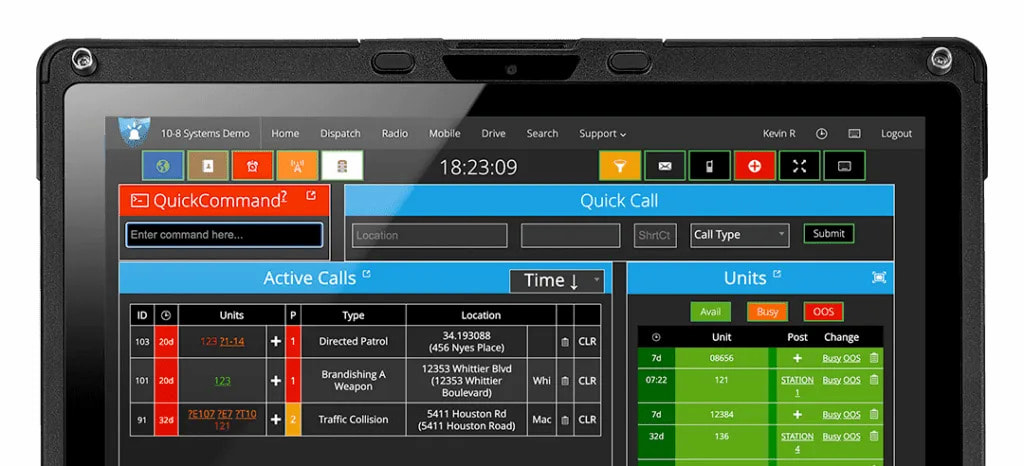
While integrated suites present several advantages for police departments, they also pose certain challenges that need to be addressed:
❗ Limited customization: Integrated suites may lack the flexibility to adapt to the unique scheduling needs of different departments. They often come with predefined workflows and features that may not align perfectly with departmental requirements.
😓 Complexity: The extensive feature set of integrated suites can lead to complexity in implementation and usage. Police departments may require extensive training and support to fully utilize all the features and functionalities offered by these suites.
💰 Cost: Implementing an integrated public safety software suite can involve significant upfront costs, including licensing fees, implementation costs, and ongoing maintenance expenses. For smaller departments with limited budgets, this upfront investment may pose a barrier to adoption.
🔑 Vendor lock-in: Choosing an integrated suite ties the department to a specific vendor for multiple functionalities. This vendor lock-in can limit flexibility and make it challenging to switch to alternative solutions in the future.
Despite these challenges, integrated public safety software suites remain a compelling option for police departments looking to streamline their operations and improve overall efficiency. By carefully evaluating their needs and selecting a suite that aligns with their requirements, departments can leverage the benefits of integration while mitigating potential drawbacks.
Hybrid approach: Blending solutions for enhanced flexibility with fragmented management
A hybrid approach to police scheduling combines the strengths of multiple solutions, offering departments enhanced flexibility and adaptability. By leveraging a mix of manual scheduling, Excel spreadsheets, mobile apps, and other tools, departments can tailor their scheduling process to meet specific operational needs. However, this approach also introduces complexities that need to be carefully managed.
🧩 Data fragmentation: Using multiple systems and tools for scheduling can lead to data fragmentation, making it challenging to maintain a single source of truth for scheduling information. Departments may struggle to ensure data accuracy and consistency across different platforms.
🚫 Integration issues: Integrating disparate systems and tools within a hybrid approach can be complex and time-consuming. Departments may encounter compatibility issues, data syncing challenges, and other integration hurdles that impede operational efficiency.
👩🏫 Training and support: Managing multiple scheduling solutions requires comprehensive training and ongoing staff support. Departments may need to invest resources in training personnel on different systems and providing ongoing technical support to address issues and ensure smooth operation.
🤹♀️ Coordination challenges: Coordinating scheduling activities across multiple platforms and tools can be challenging, leading to potential conflicts, errors, and inefficiencies. Departments must establish clear protocols and communication channels to ensure seamless coordination and collaboration among staff.
Despite these challenges, a hybrid approach offers departments the flexibility to tailor their scheduling process to their unique needs and preferences. By balancing the benefits and drawbacks of each scheduling method and implementing effective strategies for integration and coordination, departments can successfully navigate the complexities of a hybrid scheduling approach.
Benefits of Scheduling Software
Implementing scheduling software offers numerous benefits to police departments, enhancing efficiency, accuracy, and overall operational effectiveness. Here are some key advantages:
🙌 Improved resource allocation: Scheduling software enables departments to optimize resource allocation by matching officer availability with workload demands. This ensures that resources are deployed efficiently, reducing response times and enhancing public safety.
🙌 Enhanced officer satisfaction: Police department scheduling software can improve employee satisfaction by streamlining scheduling processes and providing greater visibility into shifts and assignments. Officers can access their schedules easily, request time off, and receive timely notifications about changes, contributing to higher morale and productivity.
🙌 Reduced administrative burden: Shift scheduling tools automate many manual scheduling tasks, such as shift planning, roster management, and time tracking. This reduces the administrative burden on department staff, freeing up time for more strategic activities and improving overall efficiency.
🙌 Enhanced compliance: Police department scheduling software helps ensure compliance with labor laws, union agreements, and departmental policies. Software solutions minimize the risk of errors and regulatory violations by automating time tracking, overtime calculations, and scheduling rules enforcement.
🙌 Real-time visibility and reporting: Police department scheduling software provides real-time visibility into officer availability, shift coverage, and operational metrics. Departments can generate custom reports and analytics to track key performance indicators, identify trends, and make data-driven decisions for continuous improvement.
🙌 Enhanced accountability and transparency: Software solutions enhance accountability and transparency within the department by maintaining detailed records of scheduling activities. Supervisors can track attendance, monitor adherence to schedules, and address issues proactively, ensuring compliance and accountability at all levels.
Police Department Scheduling Software: Final Notes
In conclusion, effective scheduling is paramount for police departments to ensure optimal resource allocation, officer satisfaction, and operational efficiency. While various options exist, Shifts by Everhour emerges as the standout choice, offering intuitive features, seamless integration, and cost-effectiveness. By leveraging Shifts, police departments can streamline scheduling processes, enhance collaboration, and ultimately, bolster community safety.
